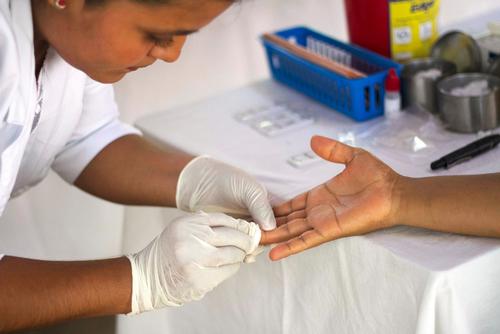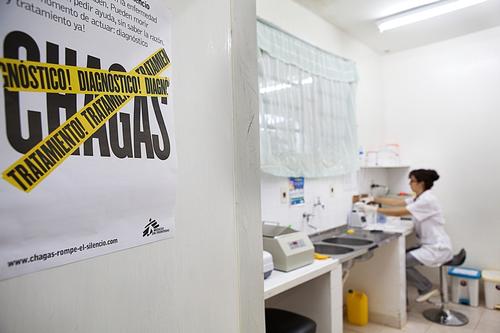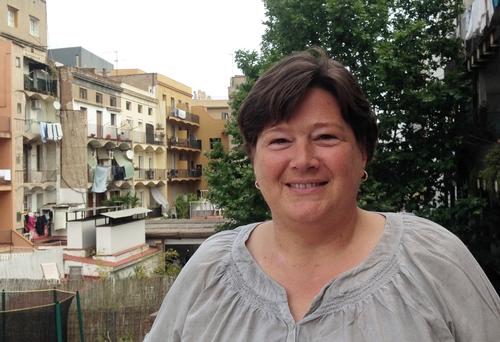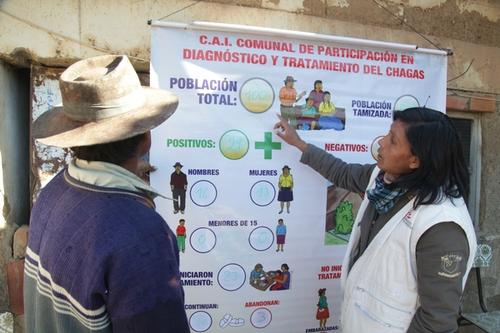The 43,000 inhabitants in San Pedro Pochutla and Mazunte, Oaxaca State, Mexico, have access to diagnosis and treatment for Chagas disease in primary healthcare facilities. The Oaxaca Health Secretariat has initiated Chagas diagnosis and treatment activities in collaboration with Médecins Sans Frontières (MSF) for the disease.
After the arrival of rapid diagnosis tests and the first batch of medicines to treat the disease, Health Secretariat staff are already diagnosing, and the first patients identified have started the corresponding treatment. So far, 1,512 serological tests to diagnose the disease have been performed.
The first Chagas-positive patient was able to start treatment by late August. Ubaldo Mendoza, 18, is from Puerto Ángel, Oaxaca. “The doctor will be checking me on a weekly basis in order to follow up the treatment process,” he explains. “For the time being, I feel good, I have nothing.” Ubaldo is not scared because he knows that there is a cure and, by receiving the 60-day treatment he requires, his health will improve and he will be able to continue with his studies.
“The collaboration between MSF and the state and federal health authorities should help to overcome the current barriers that still exist in accessing Chagas treatment,” says Marc Bosch, MSF head of mission in Mexico. “This will enable to replicate similar initiatives in other areas in the country where Chagas is also endemic. So, in the future, the more than 1.1 million people estimated to be infected in Mexico could be properly diagnosed and treated.”
Comprehensive, integrated healthcare project
The project, stemming from the collaboration between MSF, the Oaxaca Health Secretariat and the Mexican Social Security Institute (IMSS in Spanish) in the state, seeks to develop a comprehensive healthcare model integrated within the health system, ensuring diagnosis and treatment for people living with the disease. In the region, Chagas prevalence is estimated to be between 4 and 12% of the population.
Developed as an integrated intervention, the project includes technical support by MSF staff to the staff working in the medical facilities in the area, the supply of rapid diagnostic tests to Heath Units, the donation of electrocardiography equipment and medicine (Benznidazole) to treat the patients.
Furthermore, MSF is offering technical support to the Vector Control Programme to eradicate the bug carrying the disease. MSF is also undertaking community information, education and communication (IEC) tasks, and capacity building for health staff in preventing transmission from mothers to children and making safe transfusions.
Chagas disease is a parasitic, systemic, chronic infection transmitted in one of the following ways: vectors (through the bite of triatomine bugs, contaminated by the parasite); (blood and haemoderivative) transfusions; congenitally (mother-child), and orally (contaminated food). Between 30-40% of those infected with the disease enter the chronic phase, and within a period of between 5 and 20 years after having contracted the infection end up developing cardiovascular (cardiomyopathies) or digestive (megavisceral) diseases.
Chagas disease is an endemic pathology in 21 countries in America, where nearly 100 million people are estimated to be at risk of getting infected. In Mexico, there are an estimated more than 1.1 million infected people, most of whom have not had access to both diagnosis and the required treatment. Every year there are over 7,700 new cases in the country. Eight states (Chiapas, Veracruz, Guanajuato, Hidalgo, Puebla, Michoacan, Mexico and Oaxaca) account for more than 69% of reported Chagas cases nationwide.
Chagas mortality is directly related to pathologies developed during the chronic phase of the disease. Between 2000 and 2012 there were 371 deaths reported in Mexico. Some studies say the global mortality rate is estimated at 15,000 deaths every year.






